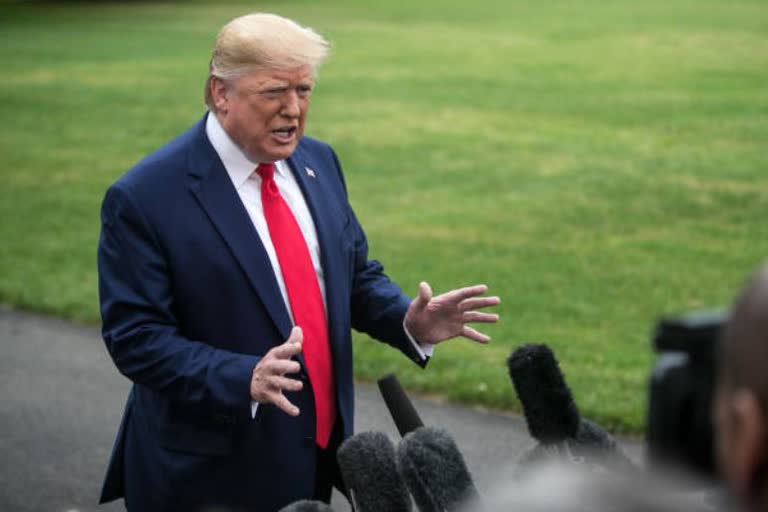Washington: US President Donald Trump has invited his Chinese counterpart Xi Jinping to sign the phase one of a bilateral trade deal when it is agreed upon, according to a top White House official.
Trade talks between the world's two largest economies began in November last year but have not yielded desired results even after more than a dozen rounds of negotiations in both Beijing and Washington.
The two countries have failed to reach an agreement to resolve the trade dispute that escalated after Trump slapped huge tariffs on Chinese goods, prompting tit-for-tat responses from China.
US National Security Advisor Robert O'Brien, who is one of the most senior members of the Washington delegation in Bangkok for the Association of Southeast Asian Nations (ASEAN) meeting, said that the US wants "great relations" with China.
"President Trump has invited President Xi to the United States if we are able to get that deal to sign phase one trade agreement, we'll have to see if that comes to pass or not. I am optimistic about it, I may actually say I'm cautiously optimistic about it.
"We think good relations between the United States and China is good for both of our countries, but it's also good for the world, it's good for the region here. So we seek good relations with China, but if we see conduct that's not fair, especially if it is conduct that is not fair to our friends and partners and allies in the region, we're not going to be shy about pointing it out," O'Brien said.
"I think we're relatively close to an agreement, a phase one agreement on trade that would make trade fairer and freer and more reciprocal between the US and China. We hope that comes to pass," he said in response to a question.
When it comes to the international waters of the Pacific, the US does not believe that any country should just seal off massive portions of the Pacific Ocean and claim that they are territorial waters like it's a lake, O'Brien said.
"Like it's a lake up in Lake Tahoe in the middle of the US. If we are talking about the South China Sea, for example, or the East China Sea, those are international waters and the United States from its foundation has always been a trading country," he said.
Read more: India's gold demand falls 32% in Q3 on high prices, economic slowdown: WGC
"The US has always been a maritime, a seafaring country, and international law allows us to go in international waters when we choose and for the reasons that we choose, and so we don't think that sailing the high seas is anyway, infringes on any other country, but I think that there is a concern when countries, I talked about this, there are countries in Southeast Asia that their natural resource patrimony, their inheritance, their future, is in their exclusive economic zones," he said.
"Their future is in being able to have commerce across international waters. And when those things are impinged by any power, that's a problem for the region, for the world. It's against the rules and not fair, not right and so the US has never been shy about calling that out," O'Brien added.
President Xi Jinping on Tuesday pledged to further open China's economy, declaring the world must "knock down walls" as he opened an annual trade fair against the backdrop of the US tariffs war.
Xi addressed an audience including French President Emmanuel Macron at the import exhibition in Shanghai, staged annually by China to show its willingness to open up its vast domestic markets in the face of criticism that they remain too closed.
The world community must "continue to knock down walls instead of building walls, resolutely oppose protectionism and unilateralism, (and) continuously reduce trade barriers", Xi said.
It was in stark contrast to his keynote last year at the height of the trade confrontation, when Xi took a swipe at the Trump administration, decrying "protectionism", "isolationism" and "the law of the jungle", while not specifically naming the United States.
Speaking after Xi, Macron complained that the US-China trade war "only creates losers" and was weighing on global growth.
He expressed hope that the world's two largest economies can reach an agreement that also will "preserve the interests" of other trade partners, like the European Union.
Without directly naming US President Donald Trump, Macron decried "unilateral action, the use of tariffs as a weapon, (and) survival of the fittest".
But the French leader also said China's market-opening "must be speeded up and made more transparent".
Xi told delegates he hoped a China-backed proposed regional trade deal could be signed soon, a day after it was dealt a blow by India's withdrawal.
"I hope the agreement will be signed and entered into force at an early date," Xi said.
China would be "happy" to reach free-trade agreements with other countries too, he said, adding that officials would speed up negotiations on an investment accord with the European Union and a joint pact with Japan and South Korea.



